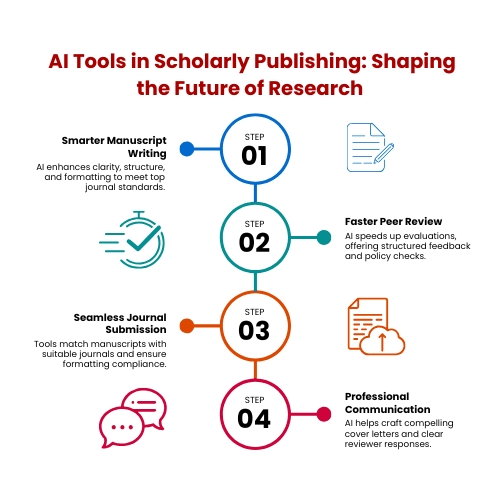
Coalition S Discontinue Journal Comparison Service: Open Access Price Transparency Contention Setting
April 24, 2025
IOP Publishing Mandates Data Sharing for Enhanced Open Science
April 24, 2025In the ever-evolving academic landscape, major academic publishers such as Wiley, Elsevier, and Springer Nature are increasingly integrating artificial intelligence (AI) tools into their workflows. This strategic integration, he said, is based on the resolve to uphold the quality of research without sacrificing the speed of operation in publication timelines.
Academic publishing also has the bright side of industries using the new emergent technologies in transforming the whole world. A huge focus is to raise the bar in peer-reviewed research quality. This has begun a paradigm shift in how researchers, scholars, and academic institutions approach manuscript writing, submission, and the entire publication process.

AI-Powered Tools: A New dawn for Manuscript Writing Services
- AI-powered tools have changed the face of manuscript writing services for an academic scholar. These smart systems help researchers by automating several activities in the writing process, from manuscript enhancement to scientific editing services, ensuring academic papers conform to the strict formatting requirements held by first-hand journals for acceptance, including helping researchers develop research papers to meet the demands of Scopus-indexed journals.
- Demand for efficient, good manuscripts is rising, and researchers are being assisted by AI in perfecting drafts for submissions. The result in research papers editing, which improves the clarity of the content as well as the elimination of errors in spelling, grammar, and structure. AI also offers proofreading to journals so that manuscripts can be in best form, synonymous with high levels of academic integrity.
Streamlining Peer Review with AI
Peer review is the all-important stage in the publication process, and AI is trying to make this important step more efficient. The AI-enabled peer review support allows journals to speed up the peer evaluation of manuscripts and reduce the time that researchers would otherwise have spent waiting for feedback on their work. These tools may check manuscripts against journal policy and provide advice regarding structure, flow, and relevance. This means that scholars are provided with timely and relevant feedback that allows them to improve the chances of acceptance for their manuscripts.
Using this approach preserves the rigor of peer review but gives efficiency to both journals and researchers. The use of AI in pre-submission peer review also helps identify potential pitfalls at an early stage in the process, allowing for PhD manuscript services to proceed well in advance of submission deadlines.
How AI Helps in Journal Submission
With the rise of AI tools, improved journal submission assistance is now available to researchers. These tools help to identify the most appropriate journals for manuscript submission; thus, authors will universally select what venue fits their work. In evaluating scope, impact factor, focus, and other important aspects, AI guides the decision-making process.
Not only that, but these AI applications can also help in manuscript formatting service which meets the specifications of the journal. This approach greatly increases the efficiency of submission. For instance, these tools make sure that manuscripts are completely ready for submission by taking out all the guesswork from it, hence saving time and effort.
Writing Cover Letters and Responding to Reviewers
Artificial Intelligence is leaving no stone unturned in cover letters writing and responding to reviewers. These two requisite functions for the submission of any manuscript are time-consuming; however, AI acts as a facilitator for researchers in formulating cover letters that are well-structured and conform to the expectations of the journal. By taking assistance from the AI, a scholar can also draft responses to peer reviewer comments professionally, thereby erasing all ambiguities and ensuring clear communication.
Using AI-generated suggestions for structured rebuttal letter preparation services enhances authors’ chances of creating responses more likely to prove favorable for manuscript acceptance, which increases the likelihood of successful publication.
A Promise of Better Research and Publishing in the Future
- With the increasing penetration of AI tools, the entire academic world is now witnessing a new era of change in academic publishing. As part of such benefits, it has made everything much easier and less time-consuming-from manuscript writing & formatting to medical writing services to preparing journal-ready documents.
- This change is fueled by the zeal to ensure continually high of research integrity while improving productivity in scholarly publishing. The different kinds of usages of these tools in research will guarantee the quality of work and the most recent trends in academic advancement.
- At PhD Assistance, we hold that fundamental value of AI in the research and publication processes. Our publication assistance services in manuscript writing and formatting, peer review support, scientific proofreading, and grammar correction are tailored to assist the scholar in overcoming the hurdles of academic publication. Whether you are submitting your work to PubMed, Scopus, or any recognized journal, our expert team is ready to help you polish and submit your work confidently.
Conclusion
AI tools have yet begun the journey of revolutionizing academic publishing as key components of the academic ecology, providing powerful arsenal research weaponries for increasing enhancement of manuscripts, improving peer review outcomes, and speeding up journal submissions.
PhD Assistance is here to provide essential academic writing services for successful submission of manuscripts while our works meet the highest standards of scholarly excellence. The future of academic publishing will, therefore, see an even greater role of AI in defining the next generation of scholarly research.


